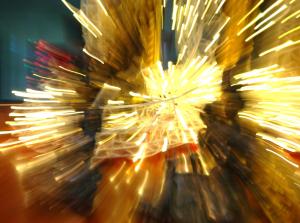
God created the universe out of nothing; this makes creation contingent in its existence. The nothingness predicated to creation is different from the nothingness which can be said to be found in and with God. The divine nature transcends being, and it is in this fashion God can be said to be nothing. God is not some being next to every other being because God is the source of being itself. God’s creative activity produces being, meaning, the production of being (and being itself) represents one of the many uncreated energies of God which can be used to give God a name (hence, why God can sometimes be designated as being or necessary being).
Since we are a part of creation, we are contingent beings, which means, we are nothing in and of ourselves. We need God to provide us our being, and with it, our existence. Once God brings us into existence,we partake of being, and so find within ourselves some portion or reflection of absolute being. That is, through God’s creative will, not through ourselves, we transcend the nothingness of non-existence. Once we have been given our share of being, we can do one of two things: we can either try to hold onto the small portion of being we have been given, close in on it, and so cut ourselves off from transcendent being, or we can look beyond ourselves to transcendent being and try to join ourselves to it and receive through it a greater share of being for ourselves. If we close in upon ourselves, we will find that the portion of being we have been given will have nothing to sustain itself, whereupon our inherent nothingness, coming from the non-existence we came from, takes over, and slowly corrupts and destroys the being which we have. If we, on the other hand, avoid such self-attachment, we will be able to follow and receive what God desires for us, which is attaining eternal life. That is, we can either hold onto what we are, and find that what we have been given will be taken away from us, or else we can deny ourselves for the sake of transcending ourselves, until, at last, we find ourselves participating in the divine life itself.
To help ourselves attain proper self-denial, we need to contemplate our own innate nothingness. We need to examine how our contingency demonstrates such nothingness, that is, how we are insubstantial in and of ourselves, composed of ever-changing aggregates or parts which are also inherently nothing. In this fashion, due to such nothingness, we can say that there is no self, that is, no real, substantial self which is in and of itself full of being. When we try to asset such a self, we end up becoming attached to it, treating it as we would the divine. That would have us try to lift up that non-self and establish it as a real, substantial self; the more we do that, the more we find we do so at the expense of others:
When the view of the perishing aggregates apprehends a self, discrimination arises between self and other. Once you have made that distinction, you become attached to what is associated with yourself and hostile toward that which pertains to others. As you observe the self, your mind also becomes inflated. You develop a belief that this very self is either eternal or subject to annihilation. You come to believe in the supremacy of a view of the self and the like, and you also come to believe in the supremacy of the detrimental practices associated with such views. [1]
When we recognize this, we have the foundation we need to transcend our delusion. We will not hold onto the self as if we were inherently self-existent. But we must be careful, and not misread this as indicating that the ultimate truth is found in nihilism. We should not think our goal should be to disconnect ourselves from our participation in being, leading to our own annihilation from being. Rather, we should accept our contingency so that we can be open to and participate in more being. Contemplating our contingency should lead us to accept that we are limited beings who can and will grow in being if we embrace self-detachment for the sake of self-transcendence. The more we open ourselves to such self-transcendence, the more we will encounter those with greater, and greater being, demonstrating our relative nothingness in comparison to them, until at last, we come face to face with God and discern, from that experience, truly what it means to say we are inherently nothing:
O brother, when the sun of Unity arises, certainly the lamp of your being, out of modesty, will flicker into nothingness! You will continue to exist since it is only with respect to appearances that you will be nothing. A lamp, face to face with the sun, for instance, would have no brilliance of itself. [2]
This experience of God’s majesty will always show us how contingent being is nothing in comparison to infinite glory of God. We can intellectually understand this, but nothing will prepare us for the experience itself, an experience which will shake us to the core of our being. If we do not resist the breakdown which follows, it will help us find ourselves being reconstructed and made greater in our reconstruction. But, if we resist, so long as we do so, we will suffer, as we will experience a continuous breakdown without the reconstruction which came from after it. Thus, it is our acceptance of our nothingness, the death we are to have in relation to the self and all attempts to prop ourselves up as if we were the absolute, is what allows us to experience what it is we desire, eternal life, and find it to be glorious:
Let us sing to the Lord a new song, for He has done marvelous things, and will do even more wonderful things by the presence of Christ, through which all things come from annihilation to re-creation, through which the old things appear as new and take on a vigorous new life by being elevated to God. [3]
Christ on the cross, therefore, not only worked out our salvation by taking on the sin of the world, that is, letting evil do its best to him on the cross, killing him and sending him to the edge of being itself in his death; Christ showed us the path we are to take for our salvation, that is, he shows us we are to take up our own cross, deny ourselves, so that we can accept our inherent nothingness. Once we do so, we will find our acceptance of such a death to the self is what leads us to new, indeed eternal, life.
[1] Tsong-kha-pa, The Great Treatise on the Stages of the Path to Enlightenment. Volume One. Trans. Lamrin Chenmo Translation Committee. Ed. Joshua W.C. Cutler and Guy Newland (Ithaca: NY: Snow Lion Publications, 2000), 300.
[2] Sharafuddin Maneri, The Hundred Letters. Trans. Paul Jackson, SJ (New York: Paulist Press, 1980), 353 [Letter 86].
[3] St Sophronios of Jerusalem, “Homily 4: Homily on the Presentation of our Lord and Savior Jesus Christ” in Homilies. Trans. John M. Duffy (Cambridge: Harvard University Press, 2020), 129.
Stay in touch! Like A Little Bit of Nothing on Facebook.
If you liked what you read, please consider sharing it with your friends and family!
N.B.: While I read comments to moderate them, I rarely respond to them. If I don’t respond to your comment directly, don’t assume I am unthankful for it. I appreciate it. But I want readers to feel free to ask questions, and hopefully, dialogue with each other. I have shared what I wanted to say, though some responses will get a brief reply by me, or, if I find it interesting and something I can engage fully, as the foundation for another post. I have had many posts inspired or improved upon thanks to my readers.













